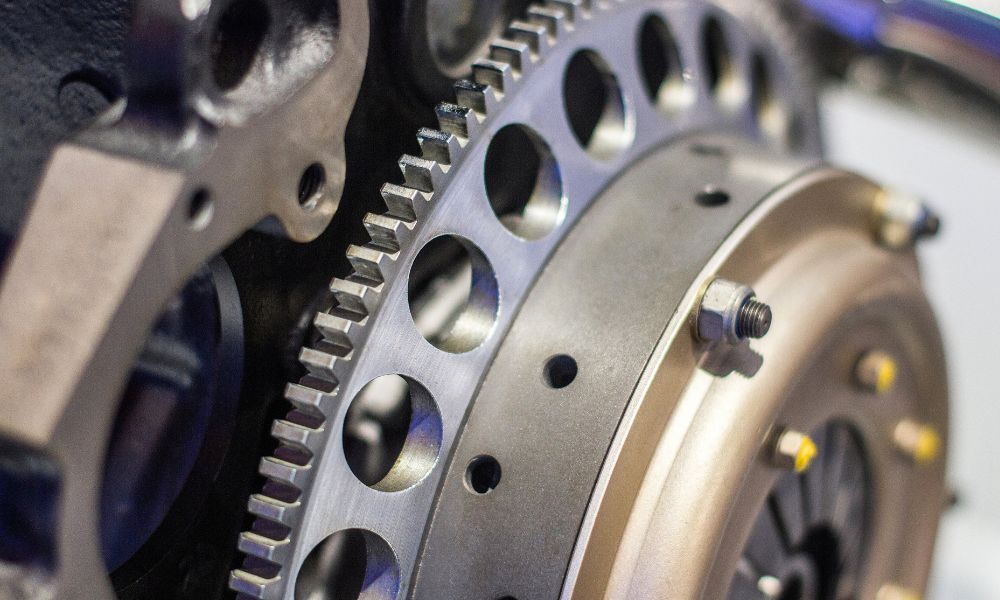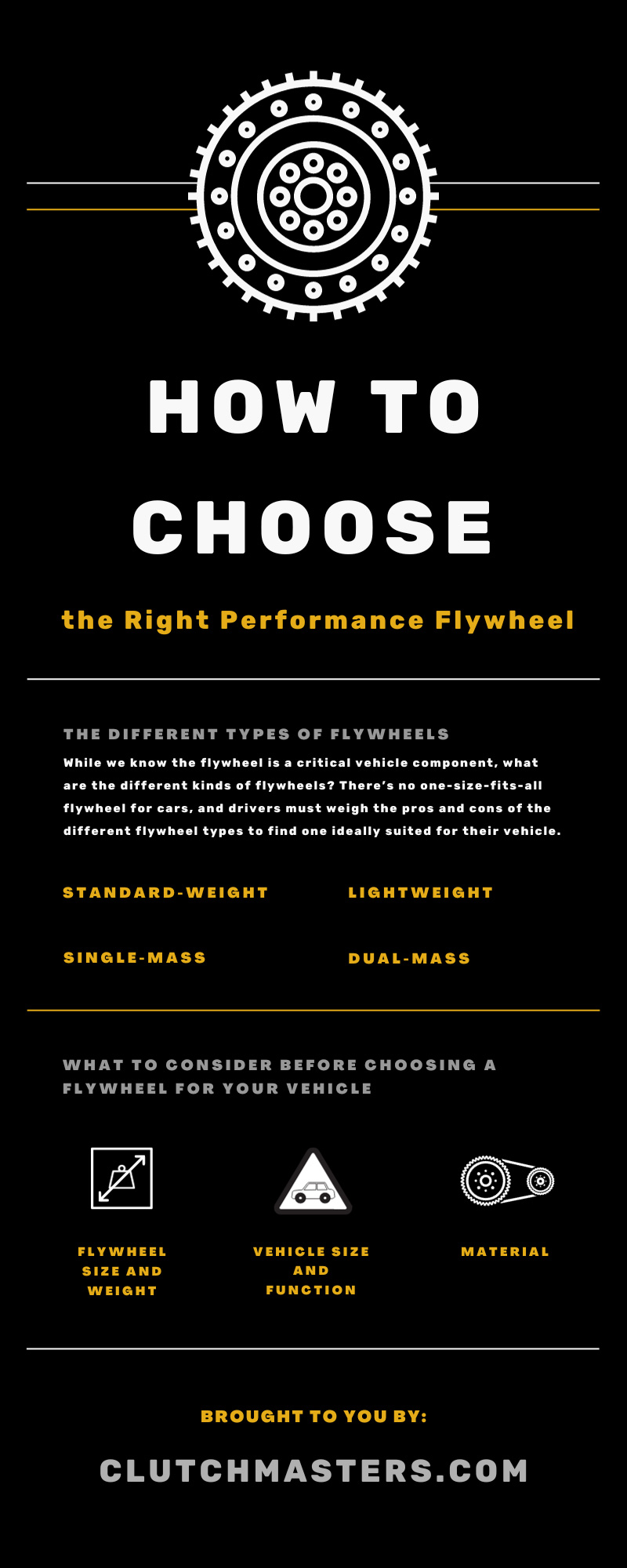How To Choose the Right Performance Flywheel

What the Flywheel Does for a Vehicle
Before we get into all the different kinds of flywheels and the unique benefits each brings to a vehicle, we’ll explain the role of a flywheel in the car. A flywheel is a solid metal disc with varying thicknesses and weights depending on the application.
The flywheel is bolted to the engine’s crankshaft and connects the engine with the transmission via the clutch to transfer the engine power to the wheels. The flywheel features a row of gear teeth on the edge to engage with the engine’s starter motor. The flywheel is critical for any manual transmission car as it provides mass for rotational inertia to keep the engine running and prevent it from stalling when the driver takes the foot off the gas pedal.
The Different Types of Flywheels
While we know the flywheel is a critical vehicle component, what are the different kinds of flywheels? There’s no one-size-fits-all flywheel for cars, and drivers must weigh the pros and cons of the different flywheel types to find one ideally suited for their vehicle.
Standard-Weight
The standard-weight or OE flywheel is what we will call the flywheel that comes with the car from the factory. The standard OE-weight flywheel is typically either cast iron or billet steel and weighs 25–40 lb.
Standard-weight flywheels store more energy than lighter ones, making them best for stock-geared and heavier vehicles. The heavier standard-weight flywheel offers a slower throttle response and will maintain the engine RPM for longer when decelerating. OE flywheels tend to be on the heavier side as they make it much easier to drive a manual transmission car in stop-and-go traffic. They also help dampen engine noise and vibrations that can transfer into the cabin.
While we typically specialize in developing a flywheel that lightens the rotating mass of an engine assembly, we have found some engines and drivers still like to have more mass in the flywheel, so for those few applications we do offer a heavy version of our billet steel flywheels.
Lightweight
A lightweight flywheel is an obvious upgrade for a purpose-built track car. A daily driven street car can also benefit from one, albeit with some trade-offs in drivability. A lightweight flywheel typically weighs 10–20 lb. Our lightweight flywheels are made from either 6061 billet aluminum and 1018 or 4140 billet steel, depending on the application and use. We’ll get into the benefits of each in a bit.
Because of its lighter weight, this style of flywheel allows the driver more responsive feedback with the engine during rev-matched downshifts with a sharper RPM rev, which works wonders on the track and in the canyons. For a daily driven street car, a lightweight flywheel comes with some trade-offs that aren’t much of a concern for a track car. Because the engine is able to rev up much quicker, it can become a bit more difficult to manage the pedal efficiently without revving up the engine higher than needed. And as mentioned before, by lightening up the rotational mass, you could start to get some noise and vibrations transferred to the cabin that might not be desired. With the ability for the engine to rev quicker, this also translates to reduced turbo lag and increases in supercharger efficiency as well as improved midrange torque.
Single-Mass
The single-mass flywheel is constructed from a single piece of aluminum or steel. Single-mass flywheels come in cars from the factory sometimes, but they are what we specialize in making here at Clutch Masters. A single-mass flywheel is a very basic concept consisting of just one solid chunk of material that is cast or machined into the correct shape and size for each application.
Dual-Mass
On the other hand, a dual-mass flywheel is a multi-piece flywheel that is connected together via a series of high-strength springs or rubber that dampen the vibration and harshness of the driveline.
Dual-mass flywheels are incredibly common in cars today, and they typically have a very significant amount of weight to them. As it becomes more and more desirable for drivers to opt for creature comforts over performance when purchasing a car, manufacturers had to develop a flywheel that worked well in a street-driven vehicle, and their main focus is using the flywheel to absorb a lot of the noise and vibrations coming from the engine and transmission. Dual-mass flywheels have their place but because they weigh so much, more energy is required to spin it, which results in a less responsive engine.
What To Consider Before Choosing a Flywheel for Your Vehicle
We’ve detailed the big points of the different flywheels available to drivers, but how does one choose the right performance flywheel for their vehicle? There are many factors to consider before choosing a flywheel, but the primary considerations should be the size and weight of the flywheel, the flywheel material, and the vehicle’s size and function.
Size and Weight
The size and weight of the flywheel are crucial factors in how it will affect the vehicle’s engine performance and determine which is best for the vehicle. The heavier the flywheel, the more engine power and energy are needed to spin it, which affects vehicle and engine responsiveness, but the better the flywheel will work at absorbing the vibrations and noise coming from the engine and transmission.
When we begin designing a flywheel for a new application, one of our primary design considerations is what should the final weight be, which typically narrows down our design elements for the size. Of course, size is also limited by the overall height the flywheel can physically be to work with the clutch and transmission as well as the ring gear that is used on that specific application.
Material
Along with the flywheel’s weight, its material composition is of significant importance. The most common aftermarket flywheel materials are 1080 or 4140 billet steel, cast chromoly, or 6061 billet aluminum. The material of the flywheel directly affects its overall weight and thus determines why that material is used. We make lightweight steel and aluminum billet flywheels, and some of our more popular flywheels are cast chromoly.
Billet aluminum flywheels are the lightest option available and are typically the first choice for a track car. Aluminum does not do a great job of absorbing harsh harmonics and will usually result in more noise being transferred to the cabin, as we’ve previously discussed. Steel is, of course, a heavier option than aluminum but does a much better job of absorbing those harmonics because of the density of the steel. The weight also helps balance out any harsh vibrations typically found in four-cylinder engines.
So as you can see, it really is a balancing act and requires an educated guess as to which material flywheel will work best for your specific application. Some people are willing to accept a little more noise with an aluminum flywheel, even in a street car, if it means they are extracting all the performance they can out of that car’s setup. A lot of choosing the right flywheel will really come down to personal preference as far as a daily driven car is concerned.
Vehicle Size and Function
The size and function of the vehicle will naturally have a huge effect on which flywheel is ideal for you. For a standard, daily-driven car with a manual transmission, lighter flywheels made from aluminum or chromoly could be considered excessive for its use. Again, personal preference comes into play here.
If you have a high-performance vehicle or track car, a lightweight flywheel is much more suited to the high-performance output and will boost engine acceleration and deceleration.
Where To Find a Flywheel for Your Vehicle
If you’re searching for a high-performance flywheel for your high-performance vehicle, then you’ve come to the right place. Clutch Masters Industries has a wide selection of high-quality flywheels for performance cars.
Still not sure which flywheel your vehicle needs? Contact our staff, and we’ll help you find a flywheel that suits your vehicle ideally and offers the performance and durability you’re looking for.



